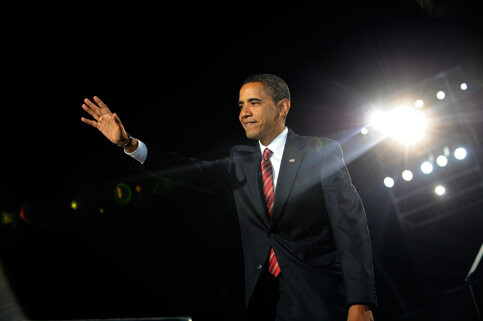The Electronic Intifada 4 December 2008

President-elect Barack Obama waves to supporters after winning the US presidential election in Chicago, 4 November 2008. (Keith Bedford/Rapport)
Besides restoring my faith in humanity, Barak Obama’s victory made me think of one thing: the first Palestinian Prime Minister in a post-Zionist, secular, democratic state in Palestine/Israel. This may sound strange coming from an Israeli living in America, but just as Obama is good for black and white Americans, a Palestinian prime minister in a secular democracy will be good for Israelis as well as Palestinians. If it can happen in the US it can happen in the Holy Land. On 20 January, an African American by the name of Barack Hussein Obama will be sworn in as president of the United States. This is a milestone if ever there was one, and there are many lessons to be learned from it. At the same time, this does not mean that we should expect that an Obama administration will offer anything new as far as US policy towards Israel and the Palestinians.
One lesson we need to take from Barack Obama’s victory is this: with razor sharp focus on a single issue, driven home here in America and in our shared homeland, we can achieve equal rights between Israelis and Palestinians in all of Palestine/Israel. The message has to be: end the apartheid. The term occupation has become irrelevant because it has come to imply a temporary situation and the Zionist rule of Palestine is clearly not temporary. The message and the effort need no longer focus on a tiny, helpless Palestinian state living peacefully alongside an all-powerful Israel that is armed to its teeth; that possibility has been obliterated for good anyway. The message and the effort should be focused on ending apartheid and a call for equal rights.
It would be naive to assume that an Obama administration will turn away from years of US blind support for Israel. Sure, it would be ideal for President-elect Obama to ask former President Jimmy Carter to be his special envoy to Israel/Palestine, but that is not likely to happen. In all likelihood there will be a return to the policies of the Clinton years, policies that may have had good intentions but lead to more of the same. The reason these policies failed and will fail again is that they do not recognize the problem for what it really is, namely the existence of an apartheid regime over Israel/Palestine.
If the last 40 years have taught us anything it is that as long as the basic premise for a solution remains partition and is not divorced from the Zionist notion of a big Jewish state next to a small Palestinian state, there can be no resolution. At this point there is no reason to expect change in American policy on the basic premise, not even from President-elect Obama. However, if the point is driven home with enough zeal, an Obama administration and the American public being sensitive to racial, ethnic and religious discrimination will eventually be forced to re-examine support for a country that practices discrimination.
The issue of Palestinian recognition of Israel is one that needs to be re-examined if we strive to move toward democracy and reconciliation. It is one of the claims Israel used to discredit the leadership of the late Palestinian leader Yasser Arafat and uses now to discredit Hamas and interestingly, the US uses this same claim to discredit Iran. But a close examination will show that on this issue there is little for which Hamas can be blamed.
Expecting Palestinians to accept the rights of an exclusively Jewish state is, plain and simple, stupid. The Jewish state has an insatiable appetite for Palestinian land, it imprisons and forces millions of Palestinians to live in exile and poverty, making the demand for acceptance by Palestinians clearly outrageous. For nearly 30 years Arafat and his successors have bent over backwards to show that they accept the existence of an exclusively Jewish state, even as that very state continued to oppress and imprison Palestinians and dispossess them of their land. Palestinian leaders have done everything they possibly could to appease one Zionist government after another in order to gain some headway, but alas they received little in return for their efforts.
Hamas leaders refuse to recognize and accept the existence of the State of Israel, but can one really blame them? Israel has to date refused to define its own borders and its own character (A Jewish State? A democracy? An ethnocracy? A theocracy?). But however Israel may choose to see itself, it is without a doubt a bi-national state that practices discrimination along ethnic and religious lines. Furthermore, the Jewish state does not recognize Palestinian national rights and aspirations, and it acts with great determination to undermine the basic human and civil rights of Palestinians.
In many ways, the comparison between blacks in America and Palestinians is Israel/Palestine is an appropriate one. The struggle of African Americans to achieve equality under the law and then their struggle to see that the equality is in fact being enacted is inspiring and can be copied; the nonviolent nature of their struggle, the moral high ground maintained by African American leaders, their spiritualism and their activism are all good models to emulate.
Palestinians in their homeland and abroad have always been educated, hard working and ethically and morally outstanding citizens. The fine qualities of Palestinians as a community and as a nation have been masked by a campaign that intentionally focuses on a militant minority that has embraced violence and is by no means typical or representative of the Palestinians as a whole.
The notion that has been created is that we Israelis and Palestinians are opposing nations, one just and righteous and the other mean and misguided, fighting for the same land. God cannot possibly be on both sides so we must choose sides for Him and thus we all fall deeper and deeper into a bottomless chasm.
We need to take God out of the discourse and accept that we are all His chosen people, and therefore apartheid and human rights abuses cannot be tolerated. These are issues that are very near and dear to people in America, particularly now that Barack Obama was elected and so this is the time to change the discourse.
Instead of fighting to end the occupation, we must focus on bringing an end to apartheid. We all need to believe it is possible and to educate young Palestinians and Israelis that they must not despair but believe in their ability to bring change. In the words of Barack Obama himself, we need to encourage them to have an audacity to hope and to believe that they can indeed make a difference. This will allow Israelis and Palestinians to achieve equality and establish a society that embraces dignity and mutual respect.
Miko Peled is an Israeli peace activist and writer living in the US. He is co founder of the Elbanna Peled Foundation in memory of Smadar Elhanan and Abir Aramin. Peled is the son of the late Israeli General Matti Peled. Please direct all correspondence to mikopeled A T aol D O T com.





